Editor’s Note:
Story highlights
CNN's Arwa Damon arrived in Iraq 10 years ago amid cloud of fear and secrecy
With no U.S.-postwar plan, Iraqi society soon crumbled into violence and chaos
Damon, who has spent much of the last decade in Iraq, recently returned
She tells the stories of Iraqis still paying the price for a war in which they had no say
It was an odd splash of color that jumped out from the drab gray shades of the dusty battleground in Iraq: a red shoe smaller than my hand, adorned with a pink ribbon and bow.
The sickening cacophony of war – the crackle of gunfire, thud of artillery and bone-shaking tremors of air strikes – drifted into a background haze.
I stood there staring at the shoe. The image remains so vivid in my mind I could paint it on a canvas from memory.
Watch: Arwa Damon looks at the lingering effect of war on Iraqis
It was dusk on one of the first days of the November 2004 battle for Falluja. U.S. military commanders would later describe it as the most intense urban combat since Vietnam.
The shoe lay in a rubble-strewn yard amid the mustard yellow debris of a partially destroyed, single-story home in a poor part of the city.
My world froze right then.
I imagined her as being a little girl with curly, dark brown hair, about 5 years old. I could almost hear the shouts as she and other children ran around the yard playing joyfully.
There were other clues about the life of the family that once lived here. Torn photographs on the ground, a teddy bear in a drawer, clothing turned into clumps of matted shreds. A lone, delicate, hour-glass-shaped tea cup that somehow survived the American bombardment, peeking out from a heap of debris
Yet the inhabitants were gone, their stories untold, their lives a mystery.
Who was this little girl? Did she spend nights curled up in her parents’ bed fearing the ghosts of al Qaeda operatives in the street? Did she burst into uncontrollable tears as the U.S. military pounded her city? Or did the family flee well before this all happened?
Was she even alive?
About a year later, I found myself at the exact same spot. I was on another embed – one of dozens – with the U.S. military. The house had been rebuilt; children darted through the yard.
I decided to knock on the door and ask about the little girl. I had a brief conversation with one of the men who answered. Like just about any Iraqi at the time, he was clearly uncomfortable with a Western TV crew and an entire platoon of American soldiers at his front door.
Falluja was no longer an al Qaeda stronghold, but its operatives still lurked in the shadows. Most of the city had been reduced to rubble.
Opinion: Why women are less free 10 years after the invasion of Iraq
The man told me the previous residents were distant relatives and had gone elsewhere. Realizing how distressed he and the other adults were, I thanked them and left. My desperate curiosity was trumped by the knowledge that our lingering presence could put them in danger if they were spotted talking to Americans.
And so that girl remains unknown to us, the outside world, like countless other Iraqi civilians caught in the middle of the invasion, the insurgency and the brutal sectarian violence that followed.
There were plenty of hair-raising moments in Falluja. We saw soldiers struck down; the festering corpses of insurgents rotting in the sun; the few remaining residents flocking to a mosque for food; the brave little boy, a bone protruding from his arm, who barely cried as the American medics tended to him.
And yet for me, Falluja is defined by that shoe, by the little girl whose story I don’t know. One of many freeze-frame moments of human agony caused by war.
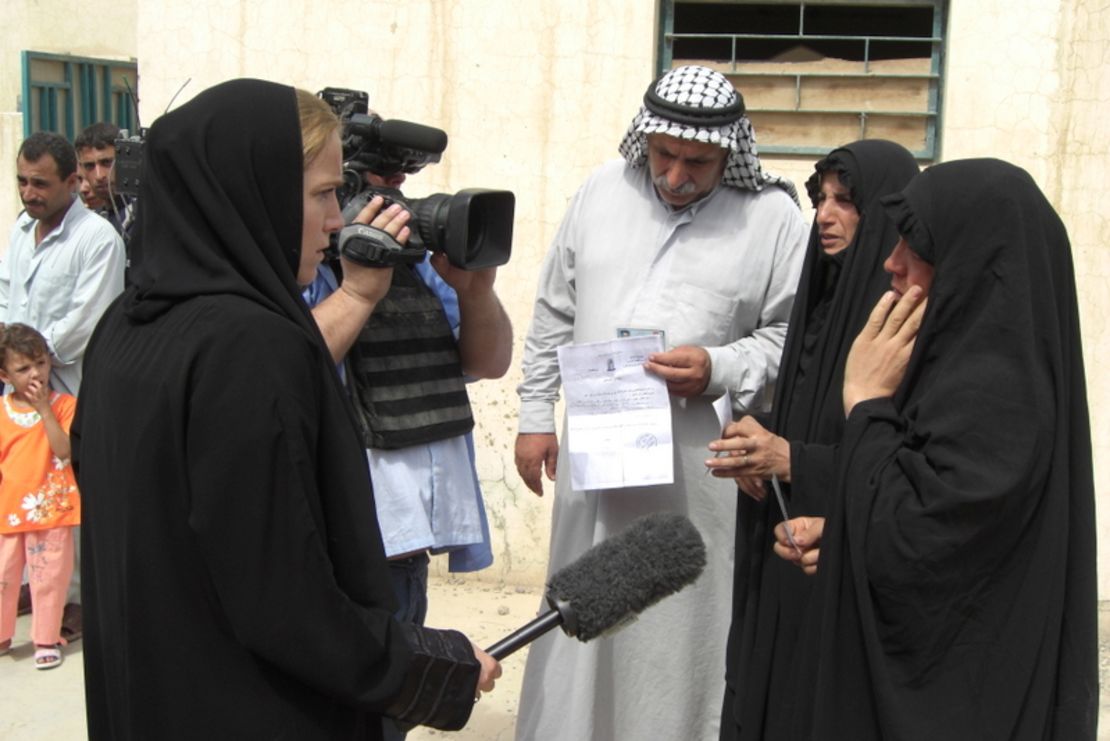
A month earlier, another battle zone was defined by another Iraqi I never met. The U.S. military had put word out to residents there to come and collect the bodies of the dead.
A woman clad in a black abaya, only her face visible, stumbled as she approached the hospital, arriving before the gates had even opened. It was as if each step was heavier than the last, as if her feet wanted to drag her away from what she knew she must see.
Then, she collapsed to her knees. Her black headdress fell off, her dark auburn hair tumbling out as she unleashed a scream filled with so much pain it felt like a claw gripping my throat.
It was the wail of a single word: “Why?”
A new brand of evil
I first arrived in Baghdad a few weeks before the U.S.-led invasion. A cloud of fear and secrecy gripped Iraq; residents spoke to me in double entendre or slipped scraps of paper scrawled with cryptic messages into my hand.
“What you hear is not true,” read one note, secretly given to me after my government minder said all Iraqis loved Saddam Hussein.
Another slip bore a message of hope. It said simply, “Yes Amreeka.”
But it’s never that simple in Iraq.
Certainly, many Iraqis wanted to be rid of Saddam. They so desperately wanted what America was promising – democracy and freedom. But their desire was tinged with a deep-seated fear and mistrust of the United States.
Few could have imagined back then just what America’s democracy project would do to their nation. How all that was familiar would be ripped away, how violence would tear communities apart, how society would have to adapt to another brand of evil more terrifying than the fear under Saddam – one they didn’t know how to navigate.
The elation coupled with shock that so many felt as Saddam’s statue came tumbling down – the hope that suddenly a world of opportunities would open – evaporated almost as quickly as the regime collapsed.
The toppling of the statue in a Baghdad square in April 2003 should have ushered in a vibrant Iraq as the Bush administration promised. Instead, it stands as the pivotal point of lost opportunity. The United States, with no post-war plan, was helpless to prevent the country from falling into chaos.
Devastating mistakes by the U.S. administration in Iraq – such as disbanding the Iraqi army and the de-Baathification campaign – alienated a sizeable chunk of the population and lay the groundwork for the Sunni insurgency. Shia militias emerged and thrived.
Hans Blix: Iraq War was a terrible mistake and violation of U.N. charter
Ten years on, the war has left more than 134,000 Iraqis and 4,800 Americans dead and cost hundreds of billions of dollars. It has left in its wake a nation whose government tends to look to the east – meaning Iran – a state the United States cannot rely upon as an ally.
Iraq has been through so much over the last 10 years: Everything that every resident knew to be normal was crushed, tearing down the very fabric, the very essence of society.
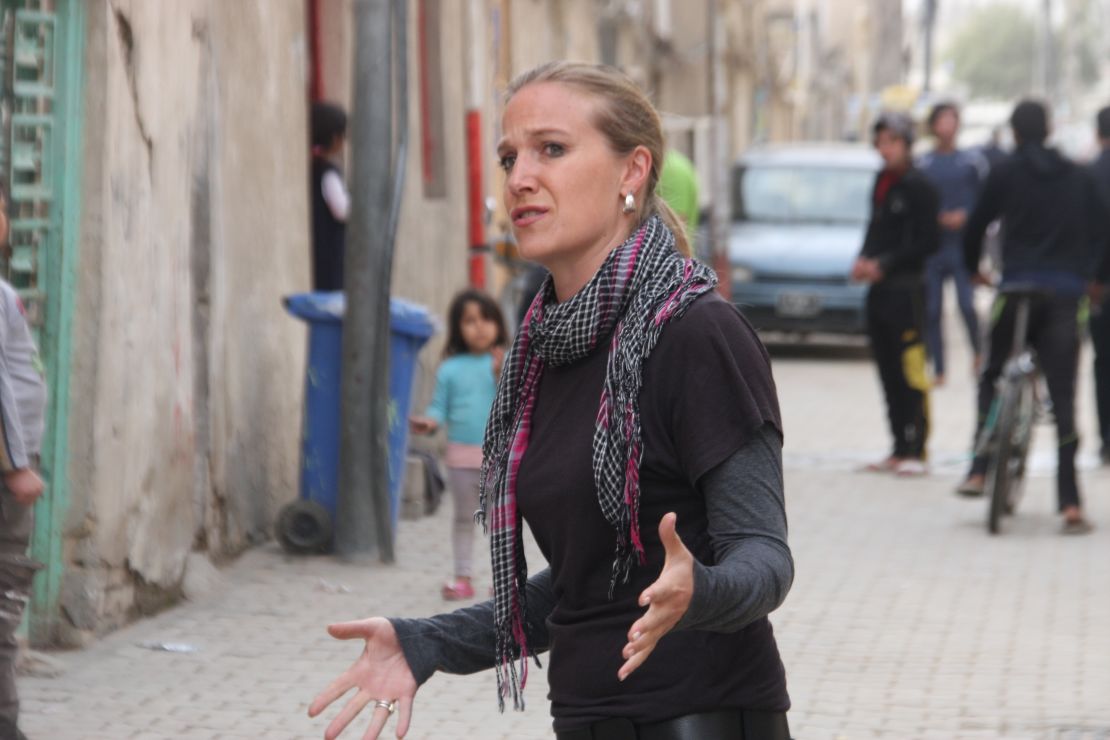
Baghdad was home for me, my permanent base, from 2003 to 2010, and since then I have taken or created every opportunity to return. It is something I have had to fight for at times, a battle fueled by – yes – my attachment to the country and its people. But also by a fundamental belief that we cannot abandon the story of Iraq, of how it plays into the region’s current dynamics and the changes sweeping the Middle East. Nor can we abandon the Iraqi people – a people still paying the price for a war in which they had no say, a war for them that has not yet ended.
It is their stories I want to share 10 years on because even today the effects of the war and the mistakes America made still linger – wearing on people to such a degree that many don’t recognize their country, don’t recognize their countrymen, don’t recognize themselves.
To survive the war, when the violence was at its worst, many residents carried two IDs – one Sunni, one Shia – to cross front lines. Trash collectors were executed in public because they worked for the government. Religious extremists forced hair salons to shut down, murdering anyone they deemed not “conservative” enough.
Mosques, churches, markets – everything – became a target.
The U.S. administration for years continued to insist there was “progress” in Iraq, until the violence became so rampant and widespread there was no denying it anymore.
And the outside world was quickly gripped with “Iraq fatigue.” It was the war everyone just wanted to forget. The war that worsened by the day for those who did not have that luxury, for whom there was no escape.
An innocence lost
Ahmed was just 12 when he saw his first street killing. Al Qaeda had taken over his Baghdad neighborhood, and every day at dusk, as the call to prayer would echo across the square, so too would the sound of executions.
At first, Ahmed was plagued with nightmares. But then the killings just became normal, part of the everyday routine.
“When they dragged [the victim] out of the car they would just shoot and leave,” Ahmed told me. “He would bleed until he died and the body would stay three to four days until the dogs ate it or the guards at night would take it away to the hospital.”
I met Ahmed for the first time on my trip back to Baghdad this year. In the square where he first saw executions, children now play soccer. But the neighborhood is still dangerous; for his safety we’re not using his real name.
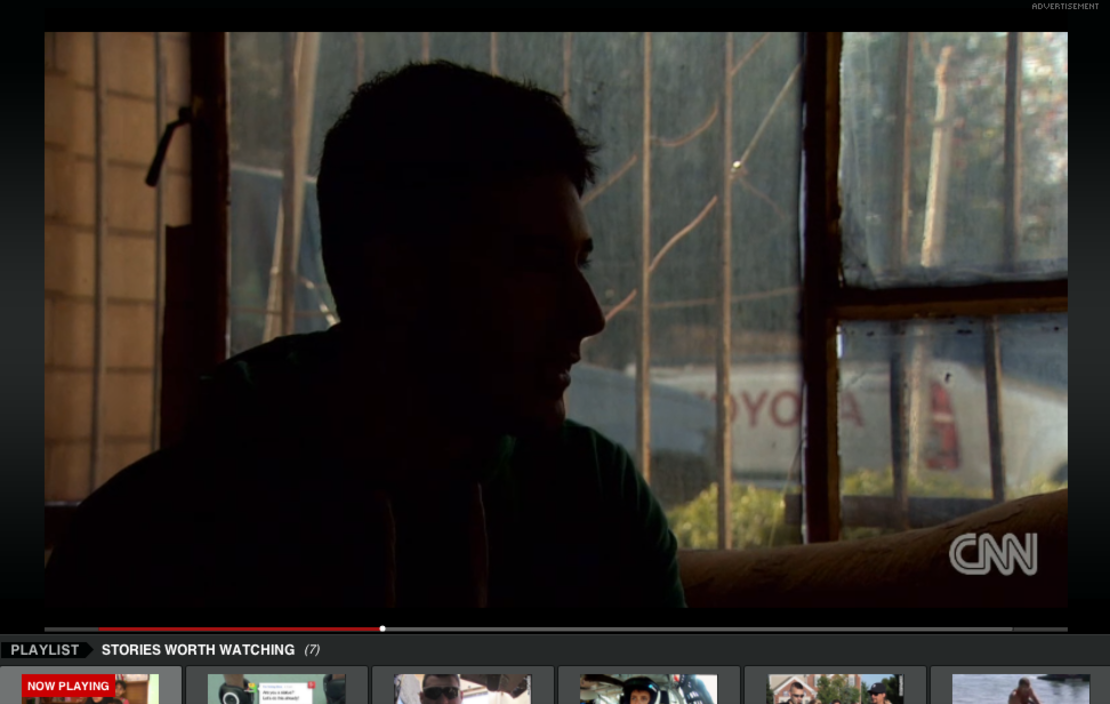
I was taken aback by how soft-spoken, polite and yet clearly tormented he is. He and his friends were so young they didn’t know what death meant: “It was only later that I learned what death was, what al Qaeda was.”
They still talk about what they witnessed. Ahmed’s goal now at 18: to get out of Iraq, to save what is left of his soul and humanity.
That’s not what he – and millions of others – dreamt of when the war began, before all the atrocities.
Day after day we journalists tried to condense the intensity, complexity and tragedy that is Iraq into our stories. At one point, just the number of unidentified bodies in Baghdad averaged 3,000 a month. How many times we must have used the phrase, “Bodies bearing signs of torture were found.”
It became part of Iraq’s daily reporting routine, a phone call made at the end of the day to get that body count, which would then be added to a wire story or rattled off in a live shot.
Lost in the numbers were the details: people who’d been tortured, their skin scraped off, fingernails ripped out, sometimes decapitated. Also lost were those left behind: a child who won’t ever hug her father again; a mother who won’t see her son’s wedding day.
‘Out of the game’
Nahla al-Nadawi is tall, slender, elegantly dressed, with a firm handshake. She worked at a local Baghdad radio station in the years after the invasion. Part of her job was to read the daily death toll.
Watch: Specter of death looms over Iraqi widow
“The numbers game, you always think that you are exempt from the numbers,” she said. “You’re pained by them, but you’re outside of them.”
That is, until her husband became one of the numbers.
“I feel like it’s a game of musical chairs – one time you are tapped, another time someone else is,” she said. “Now my son and I are out of the game, completely, completely …”
She pauses, reflecting, trying to navigate her own pain, trying to understand how life can be so cruel.
The image of her husband – tall and proud – a doctor who moved his family back to Iraq after the fall of Saddam Hussein because he believed his country needed him, a father who doted on their 6-year-old autistic son – was forever changed in April 2007.
Etched into her memory is the vision of his charred body, melted together with nine others after a car bomb exploded, leaving a twisted pile of scorched flesh.
“Truly life was in color, and now it’s in black and white.”
Her voice is soft and even. The words she chooses thoughtful, emotive, graceful – even while speaking of what she saw of her husband and the others in the morgue that day.
“I remember a blue-colored sheet covering something. At one end the pigtails of a little girl with red ribbons, at the other a tiny foot. The sheet was drenched in blood. At that moment I forgot why I was standing there. I was crying for all those other people.”
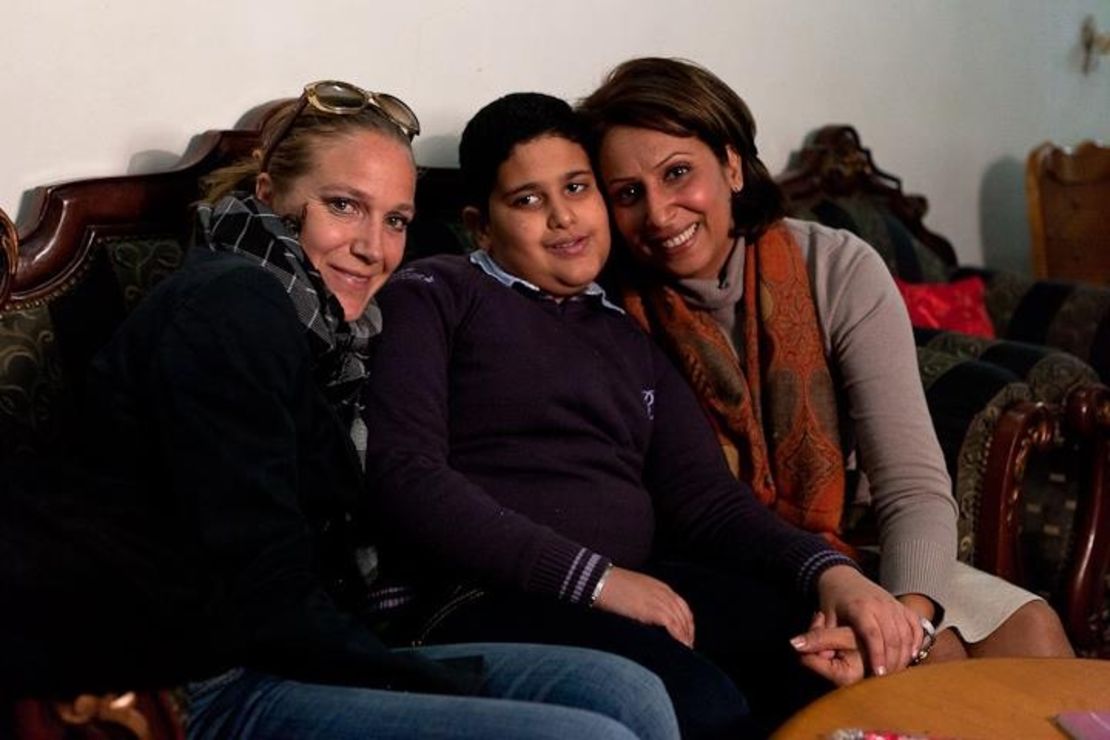
I saw her a year ago. She looked almost radiant, as if the cloak of death had lifted. In some ways it had been – or perhaps it was that she had learned to live with the pain.
“I have the courage to say that I was happy when the Americans arrived, but then I have hundreds of questions,” she said. “Why did the Americans make so many mistakes? Was it out of ignorance about Iraq, or was it deliberate?”
But on this trip, when we called her, she said she didn’t want to speak on camera. She said she didn’t want to appear weak and defeated – the story of so many Iraqis, just surviving day to day, as if they’ve been anesthetized.
Courage amid the carnage
Mohammed Rejeb cradled his grandson in his arms, filing out of his home with the rest of his family. Marines entered guns drawn, going from room to room in search of terrorists.
It was November 2005 in the small dusty town of Husayba, tucked against the Syrian border in al-Anbar province, a vast sprawling land along the Euphrates River valley and part of al Qaeda’s kingdom.
U.S. troops conducted these searches in cities, villages and towns across Iraq. It was an unconventional battleground, but typical of the war in Iraq. Entire streets and homes were booby-trapped. Washing-machine timers were hooked up to artillery shells in yards. Gunmen lurked in alleys, hiding behind doors. They were effectively on suicide missions, wanting to kill as many Americans before being gunned down.
Civilians never wanted to talk about al Qaeda. Doing so would bring a death sentence.
But I’ll never forget what Mohammed told me while while waiting for U.S. forces to search his home that day in 2005: “We want the Americans to save us from the terrorists.”
It floored me. I stared at the baby in his arms and was stunned by his courage. He could be killed for those simple words. Al Qaeda was known to slaughter anyone who dared speak against them.
A few hours later, I was crouched on a rooftop as rocket-propelled grenades fired by insurgents flew overhead and a U.S. soldier called in targets for air strikes. The heavy American bombardment reduced buildings to dust, explosions so powerful they would catapult an entire roof toward the sky as if it were cardboard.
Two days later, I saw Mohammed again, standing atop the rubble of one of the homes I might have seen bombed. He was among those digging through the wreckage, looking for one last body, that of a little boy, in what was once his cousin’s house.
The remains of 16 people had already been pulled out. All but one were women and children. They were later buried in a garden nearby; a curfew prevented people from taking the bodies to the graveyard.
They were Mohammed’s relatives; his cousin’s family.
As I arrived on the scene, mourners were in the process of moving the shrouded bodies. People pulled back the white burial cloths to prove to us these were innocent civilians.
In one shroud, a boy and girl lay curled up against each other.
The mourners, Mohammed among them, then pulled the last body out of the crushed home, that of 11-year-old Abdullah – the son of Mohammed’s cousin. Abdullah’s body was covered in a thin layer of gray dust.
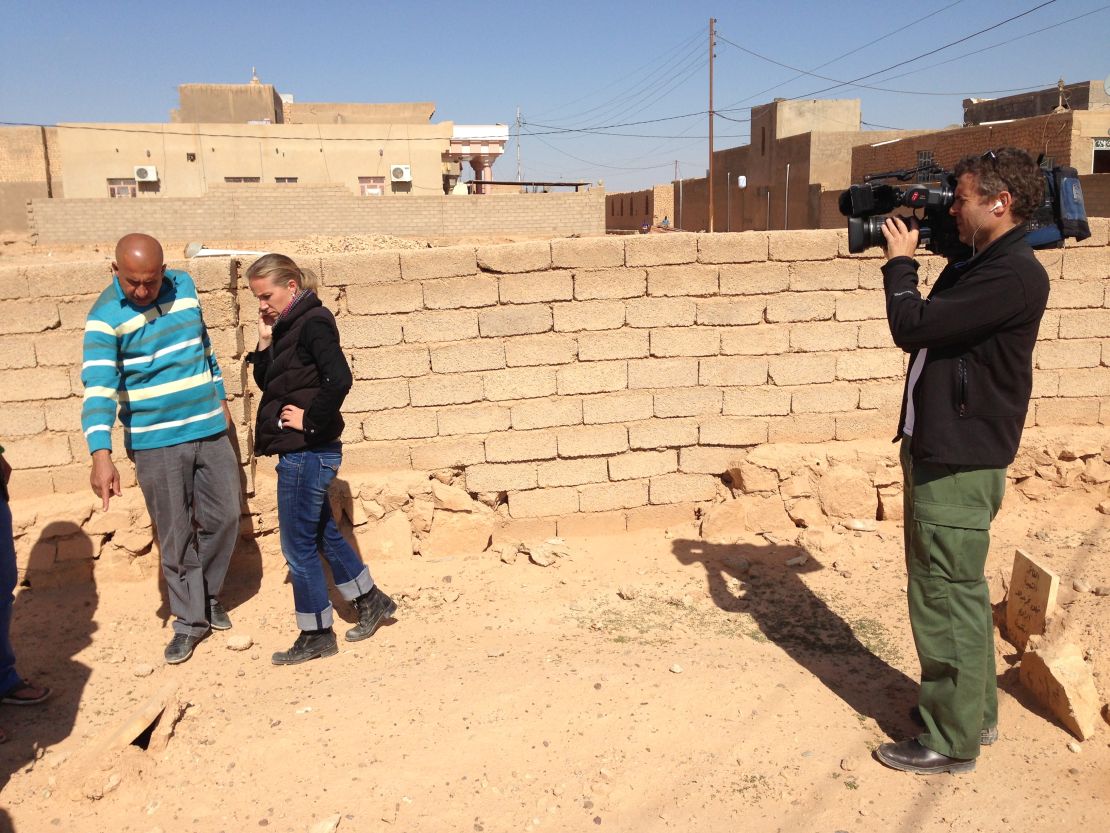
“Look at him, look at him, you would swear he was sleeping,” Mohammed said.
The two of us didn’t speak beyond that moment, one of those tragedies reporters often come across in war – bearing witness to others’ sorrow and pain.
Last month, I returned to Husayba to find Mohammed.
The Euphrates River glittered in the sunlight on the ride there, past villages and towns once dominated by al Qaeda terrorists.
I hardly recognized Husayba. The market was vibrant, alive, packed with people.
A CNN stringer had already tracked down Mohammed, and he was happy to speak with us, to see me again.
I was both eager and apprehensive: What do you say to a man you watched in the rawest moment of profound grief?
I had thought of him often over the years – even felt connected to him in a strange way. At the same time, I felt as if I had no right to that connection. I was an observer to tragedy, while this was his life; these were his relatives killed before his eyes.
My fears eased as soon as I saw him again. He flashed the biggest smile and gave me the warmest handshake. I smiled back, told him he looked the same and that I had often wondered about him and his family.
Then he pointed to a young man behind him. “Look, that’s my son, who had the baby I was carrying.”
Then he continued in a matter-of-fact manner: “He was shot in the stomach by the Americans.”
That happened after the fight for Husayba, he told me. His son was driving his truck around a corner when suddenly he came across a U.S. foot patrol that opened fire.
Mohammed then asked how I was doing; he’d heard a rumor I had been kidnapped.
I laughed and reassured him I was fine. His concern for a near-stranger and his hospitality were utterly humbling.
The two of us then walked toward his house, a bizarre neighborhood tour with morbid commentary as he pointed out buildings and streets: “That’s the road you came down. … Al Qaeda took over that house! … Look, that’s where a foreign fighter was killed.”
Prior to the U.S. operation, he had tried to confront al Qaeda fighters stationed on his street, imploring them to move for the sake of the children in the area. They told him to shut his mouth or else.
As we walked into his home, he asked if I remembered the moment we met – when his family huddled in their small veranda while troops went from room to room.
Then he proudly introduced his grandson, the baby he was holding that day, now almost 8.
I asked him what I had been wondering for so long: Why did he speak up about the presence of al Qaeda and ask the Americans to save them?
“We had nothing left to lose,” he said. “We wanted security. But we never imagined that we would pay this price, that the Americans wouldn’t differentiate between friend or foe – it was all the same to them.”
He remembered the stench of death that day he dug through the rubble, the sickeningly sweet smell of decomposing bodies. But he couldn’t articulate his emotions, how he felt when he realized his relatives were among the dead.
At the nearby graveyard, some of the original rocks used to identify the graves still remain, with crudely hand-etched names engraved at the time.
Row after row, the rocks bear the same date: 7-11-2005.
Staring at those stones, I remembered what Mohammed had told me earlier while we talked over tea.
“I wish the Americans had never come. They ruined our country. They planted divisions,” he said. “They made us cry for the days of Saddam Hussein.”
No longer home
Ten years on, one can easily look around Baghdad and see a veneer of normalcy. But nothing about Iraq or what it has been through is normal. The cloak of sorrow that hangs over the capital is more suffocating than ever, even if violence is slightly down.
“We’re not living,” one Iraqi colleague told me. “We’re just surviving.”
It’s as if the violence created a fa?ade. People were so focused on staying alive they didn’t fully notice the corruption, suspicion and tribalism that had seeped into society and government. Now that attacks are down – and fewer Iraqis are killed every day – all that and more has risen to the surface.
Basma al-Khateeb and her two daughters, 22-year-old Sama and 14-year-old Zeina, are among the remnants of Baghdad’s elite – a family that could have left but chose to stay. Basma is an IT professional and well-known activist.
We’ve known Basma and her family for years – she is a regular guest on CNN – and have always marveled at their courage and determination, a love for country that trumped their desire to escape.
Watch: Teens see no hope for future
But even Basma is uttering what for her was unimaginable. “I lost hope six to seven months ago,” she said. “You don’t feel it’s home any more.”
She paused, crushed by the weight of her own words. “Did I really say that?”
“Now the fear is different,” she explained. “You don’t know who is in the next car. They look at you as if you are different, your clothes, or even your gestures, your body language is different. We’re not comfortable being around the streets.”
“I think the people changed,” her daughter Sama added. “I think the ones who are good left, and only the bad people stayed here.”
It’s such an emotional, mentally complex notion that the family struggles to clearly define it – to be an alien in your own country.
“It’s a different culture, it’s a tribal culture. Before, there was no kind of culture that was dominant.”
Now there is. The streets feel hostile, and people continue to be wary of each other.
For the young, there is no room to mentally expand. For a professional like Sama, it’s either adopt the “principles” of corruption or find yourself unemployed.
“I had hope in the beginning and then I lost it,” she says. “It was like climbing the stairs and then there’s no end to it. You have to go down the stairs again. And that is depressing and very disappointing.
“This is no place for us. Because if I stay here, I have to be corrupt also, to live, to survive.”
In another time and place, Sama might have pursued her passion for the arts. She plays the piano beautifully. It’s a dream she plans to pursue far from her homeland.
As for Zeina, who has known nothing but war, she too wants to leave. Her first memory is of violence. Her defining moment of the last 10 years was a church bombing in 2010 in which her best friend was killed.
For their mother, this is the only home she has known. “I don’t want to have another home.”
But Basma wants something better for her daughters.
“In a certain time, at a certain point, it’s best for them to leave,” she says. “For study or work … for them to find out about themselves (and) be strong. They will not be strong here.”
Tragically, so many Iraqis I know echo those same sentiments. For the vast majority of them, the defining moments of the last 10 years are not of Saddam Hussein’s trial and execution, the drafting of the constitution or dipping their fingers in purple ink in the first elections.
It is the moment they last saw their loved one, gave them that last hug or kiss goodbye – not knowing it would turn out to be such a precious moment – before they were inexplicably, harshly torn away.
CNN’s Mohammed Tawfeeq and Wayne Drash contributed to this report.




